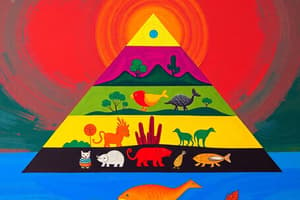Podcast
Questions and Answers
Plants, such as ______, are at the bottom of an energy pyramid
Plants, such as ______, are at the bottom of an energy pyramid
producers
Herbivores, or primary ______, are the next layer in the energy pyramid
Herbivores, or primary ______, are the next layer in the energy pyramid
consumers
Carnivores and omnivores make up the secondary ______ level
Carnivores and omnivores make up the secondary ______ level
consumers
Tertiary consumers, the third ______, consume secondary consumers
Tertiary consumers, the third ______, consume secondary consumers
What is the primary role of producers in an energy pyramid?
What is the primary role of producers in an energy pyramid?
What do herbivores consume in an energy pyramid?
What do herbivores consume in an energy pyramid?
What is the main difference between primary and secondary consumers in an energy pyramid?
What is the main difference between primary and secondary consumers in an energy pyramid?
What percentage of energy is lost as it is transferred from one trophic level to the next in an energy pyramid?
What percentage of energy is lost as it is transferred from one trophic level to the next in an energy pyramid?
What is the name for each layer of the energy pyramid?
What is the name for each layer of the energy pyramid?
What is the process by which plants produce glucose using sunlight and carbon dioxide?
What is the process by which plants produce glucose using sunlight and carbon dioxide?
Give an example of a tertiary consumer in an energy pyramid.
Give an example of a tertiary consumer in an energy pyramid.
What is the name for each level of the energy pyramid?
What is the name for each level of the energy pyramid?
What is the main source of energy for producers at the bottom of an energy pyramid?
What is the main source of energy for producers at the bottom of an energy pyramid?
What is the percentage of energy that is lost as it is transferred from one trophic level to the next in an energy pyramid?
What is the percentage of energy that is lost as it is transferred from one trophic level to the next in an energy pyramid?
Study Notes
- An energy pyramid is a graphical representation of energy flow in a community, displaying different groups of organisms at various levels
- Producers, such as plants, are at the bottom of an energy pyramid. They use sunlight and photosynthesis to produce glucose, which can be converted to energy
- Plants take in sunlight, carbon dioxide, and water to produce glucose and oxygen
- Herbivores, or primary consumers, are the next layer in the energy pyramid. They consume producers, such as plants
- Carnivores and omnivores make up the secondary consumers level, consuming primary consumers. Examples include frogs, lizards, snakes, and many birds
- Tertiary consumers, the third level, consume secondary consumers. Carnivores fall into this category, such as wolves, lions, and hawks
- Each layer of the energy pyramid is called a trophic level
- Only 10% of energy is transferred from one trophic level to the next, with 90% being lost, mostly as heat.
Studying That Suits You
Use AI to generate personalized quizzes and flashcards to suit your learning preferences.
Description
Test your knowledge about energy pyramids and trophic levels with this quiz. Learn about the flow of energy in a community, from producers to consumers, and how each level is connected in an ecosystem.




